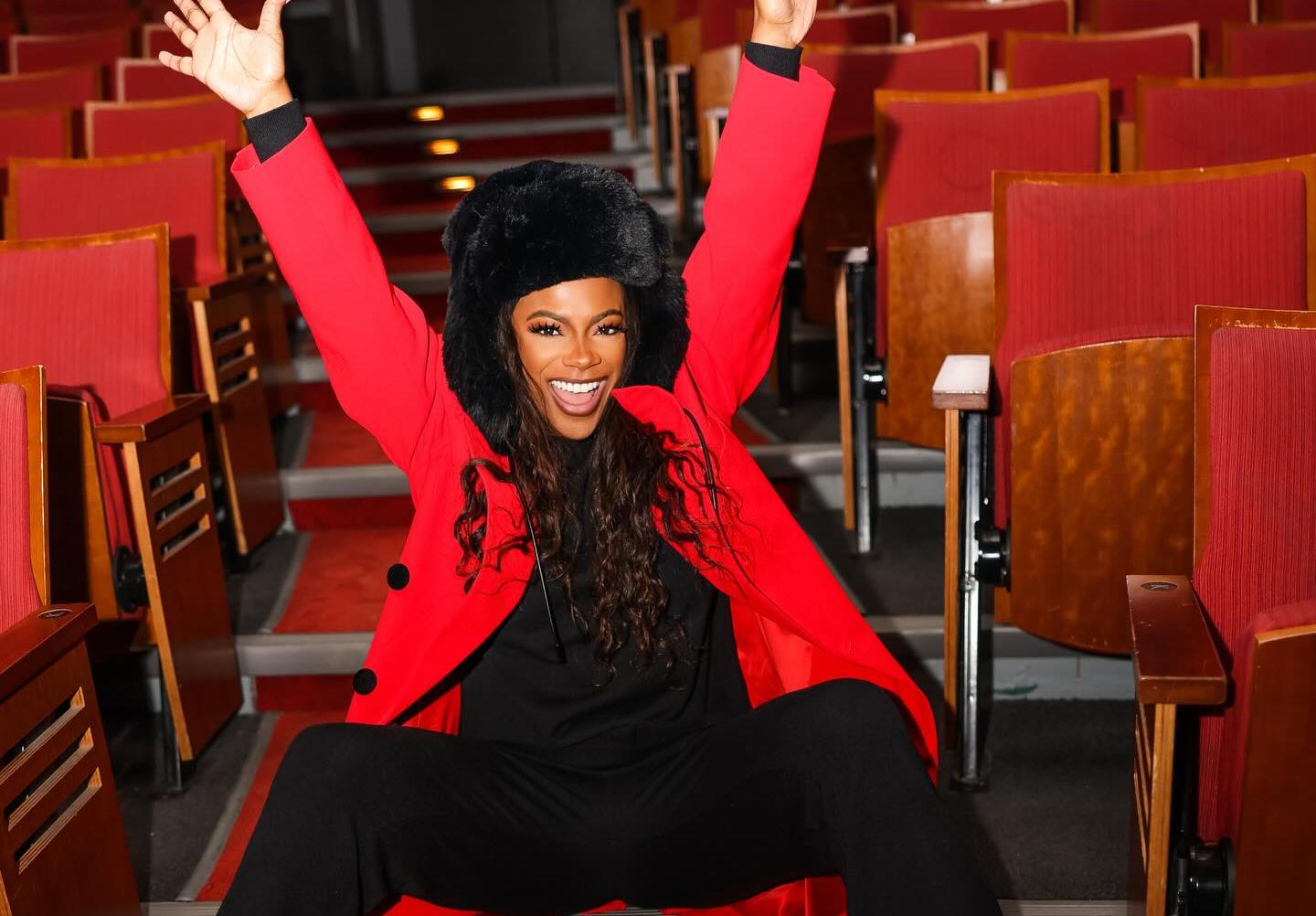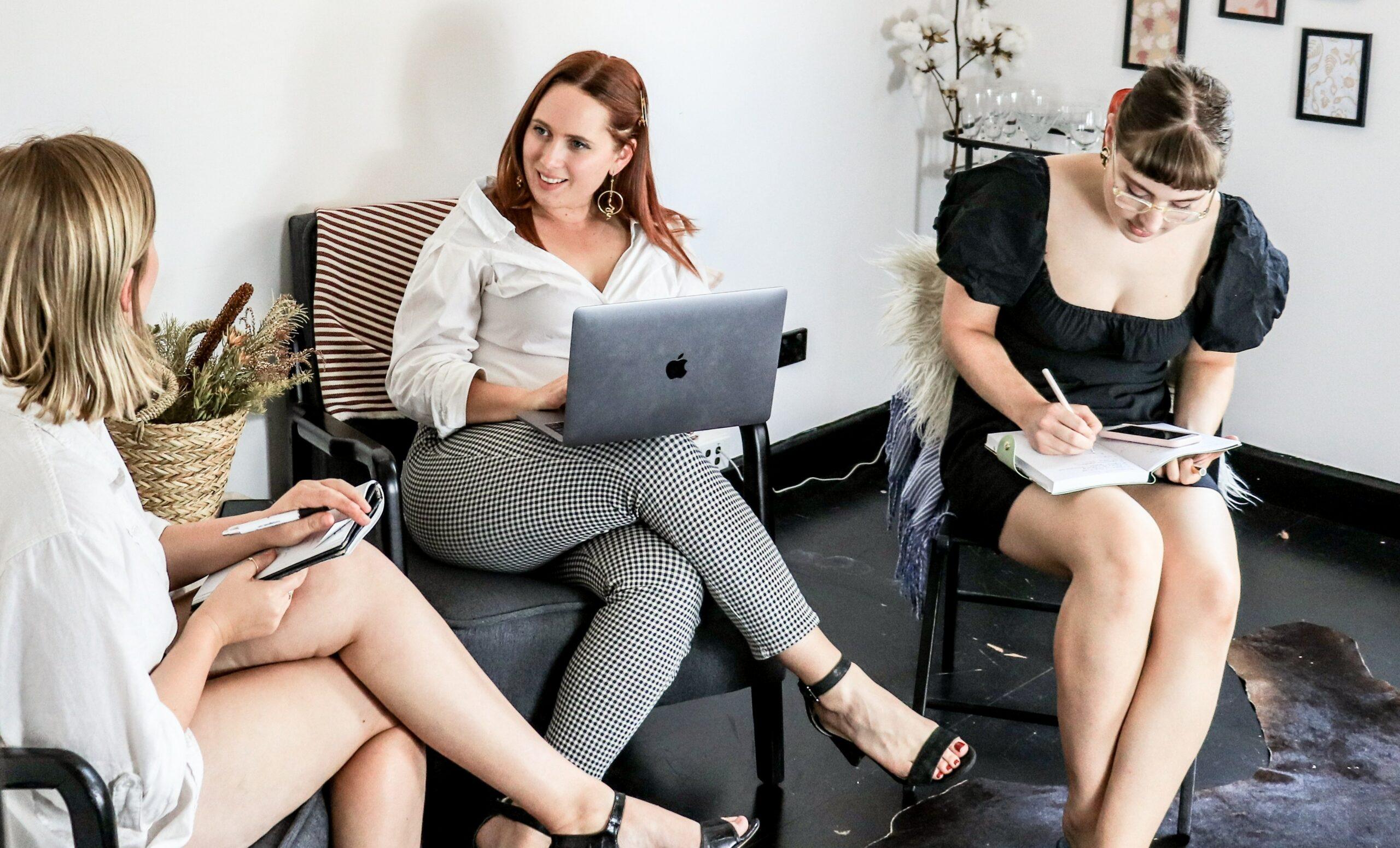Congresswoman Jasmine Crockett is redefining the role of a leader in American politics, dedicated to empowering women and underrepresented communities while fiercely protecting civil liberties. Her journey began as a passionate public defender and civil rights attorney, where she made it her mission to advocate for the most vulnerable, especially women and children. Now serving Texas’ 30th Congressional District, Jasmine’s commitment to justice and equality drives her every action. During the 87th Texas Legislative Session, she broke records as the sole Black freshman, filing more bills than any other newcomer and securing significant advancements in criminal justice reform. As a founding member of the Texas Progressive Caucus and Texas Caucus on Climate, Energy, and the Environment, she is a steadfast advocate for fairness and the empowerment of women in all arenas.
In Congress, Jasmine Crockett continues to forge paths for women and drive meaningful change. Since January 2023, she has been a beacon of leadership, taking on the role of Vice Ranking Member of the House Committee on Oversight and Government Reform, and playing significant roles on the House Judiciary Committee. Her influential position as Communications Task Force Co-Chair for the Democratic Women’s Caucus highlights her dedication to elevating women’s voices and issues in politics. With a B.A. in Business Administration from Rhodes College and a J.D. from the University of Houston, Jasmine combines her legal expertise with a deep commitment to advocacy.
Her Agenda spoke with Congresswoman Crockett to spotlight her impactful leadership in advocating for women, her path to law, and her commitment to amplifying women’s voices in politics.
Her Agenda: What inspired you to pursue law and politics?
Jasmine Crockett: What inspired me to pursue law was a professor at my school. Professor Pohlmann, he was the mock trial coach, and he recruited me to do mock trial after seeing me in a musical on campus. But I was a business major who was set on going into accounting at that time. He convinced me to apply to law school after I became an All-American, during the one year that I did a mock trial. And I got a full ride to go to law school. [So] I thought, well, if I don’t like it, I’ll just quit. I just would have lost a year of my life. So that was pretty much how I got there. There were a couple of other incidents, in my opinion, that played a role in getting me to that decision. But yeah, it was more so never planned, at least not planned by me. It was obviously God’s plan.
As far as politics is concerned, I ended up going into politics because there were a couple of cases that I dealt with that just really frustrated me. The elected prosecutor at that time decided to prosecute a 17-year-old as a felon, and I ended up getting him on a probation revocation. This was an indigent kid who came from a family where mom was struggling to make ends meet. I couldn’t help but think how, in my mind, this isn’t the intent of the law, and there was nothing fair about this. [In fact], we were actually doing a bigger disservice than not by prosecuting this kid. I got so annoyed and felt as if these prosecutors were just not doing what they needed to do for the people that lived in my town. [So] I decided at the age of 28 to run for district attorney. Ultimately, I won the early vote, lost on election day, and thought, all right, well, I’ve done that now and I’ll never run for office again. It was approximately 10 years later that I ended up running for the state house, again being frustrated with what I was experiencing within the law, and thought it would just be better if I wrote the laws.
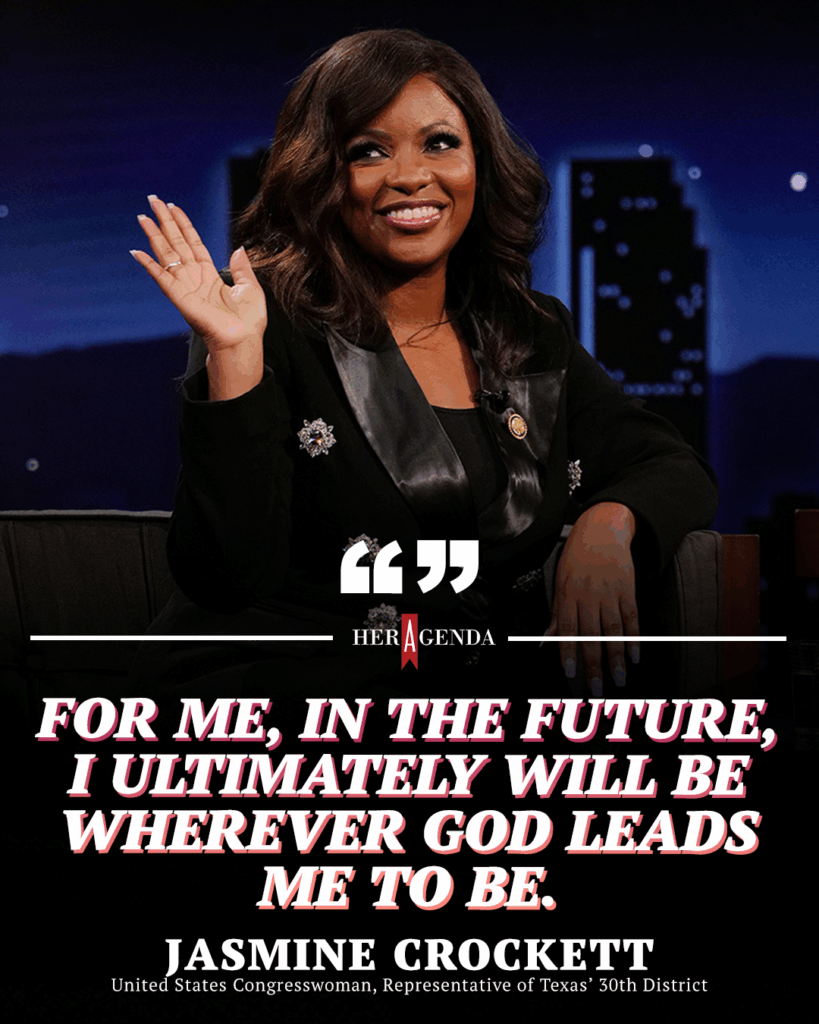
Her Agenda: Where do you see yourself in the future of politics? And I know that this has to do with current events, that the president has mentioned you a lot as an adversary.
Jasmine Crockett: Yeah, he’s mental, though, so I don’t know how much stock I would put into the things that the crazy man says. But for whatever reason, he obviously sees me as formidable. I think it is because, traditionally in politics, people have some level of decorum. He doesn’t. He is used to punching people, and nobody punching him back. I probably was one of the first elected [officials] that refused to be bullied or punched. If he’s going to punch me, I’m going to punch him back. I’ve never met him. I don’t know how he feels about me. I don’t really care. What I care about is the harm that he’s bringing to the American people. And when I say the American people, I mean all people. The harm that he’s inflicting, unfortunately, for a lot of his supporters, is going to hit them harder than those of us who don’t support him. Rural America is about to really be in for a rude awakening because of some of the terrible bills that he passed. Because there are so many people in urban America, we will be able to take a little bit more of the impact. We’ll be able to have a softer landing. It’s a lot of Democratic states that generate more revenue than Republican states. They can take a little bit more.
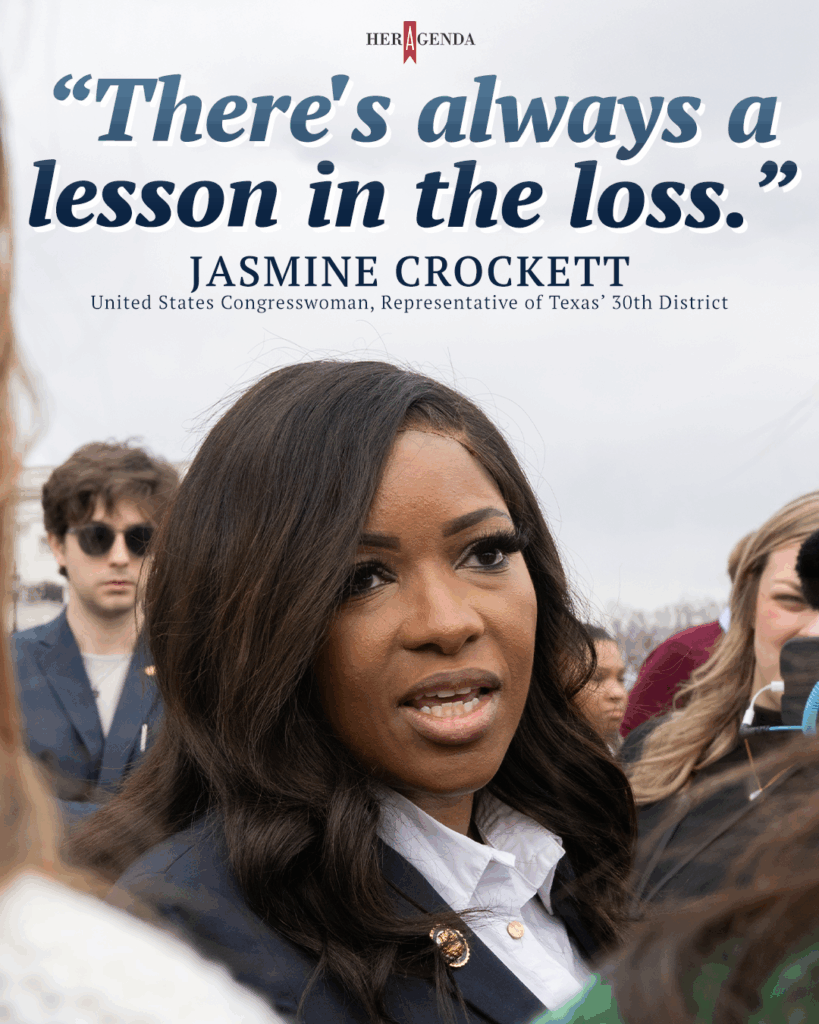
For me, in the future, I ultimately will be wherever God leads me to be. I never thought that I would be in elected office at all. It was definitely a spiritual journey. When I first ran for office, I spoke to my pastor at that time and told him all these things that were happening that made me believe that God was really moving me to run for office. [My pastor] counseled me, ultimately not knowing that His plan was to deliver me to Congress at that moment. I had to run that race so that I could get to where I am now. And a lot of times I give speeches, and one of the themes that I hit sometimes is that there’s always a lesson in the loss. There were so many things that I learned in that first race that I lost that allowed me to be better positioned to win ultimately. And if I had become the district attorney in Texarkana, I can guarantee you I would not be in Congress today. As I get older, I feel like I trust [myself] more and more because nothing about my life has been what I planned it to be, but, truly, when you walk in your purpose, your purpose just overflows. It shines everywhere that you go. I tell people all the time that there’s not anything extraordinary about me in my mind. But because this walk is not one that I put myself on, this journey is not one that I put myself on; it is a special journey. Therefore, my steps are ordered, which is why there is so much “goodness” that has come in such a short amount of time as relates to my service.
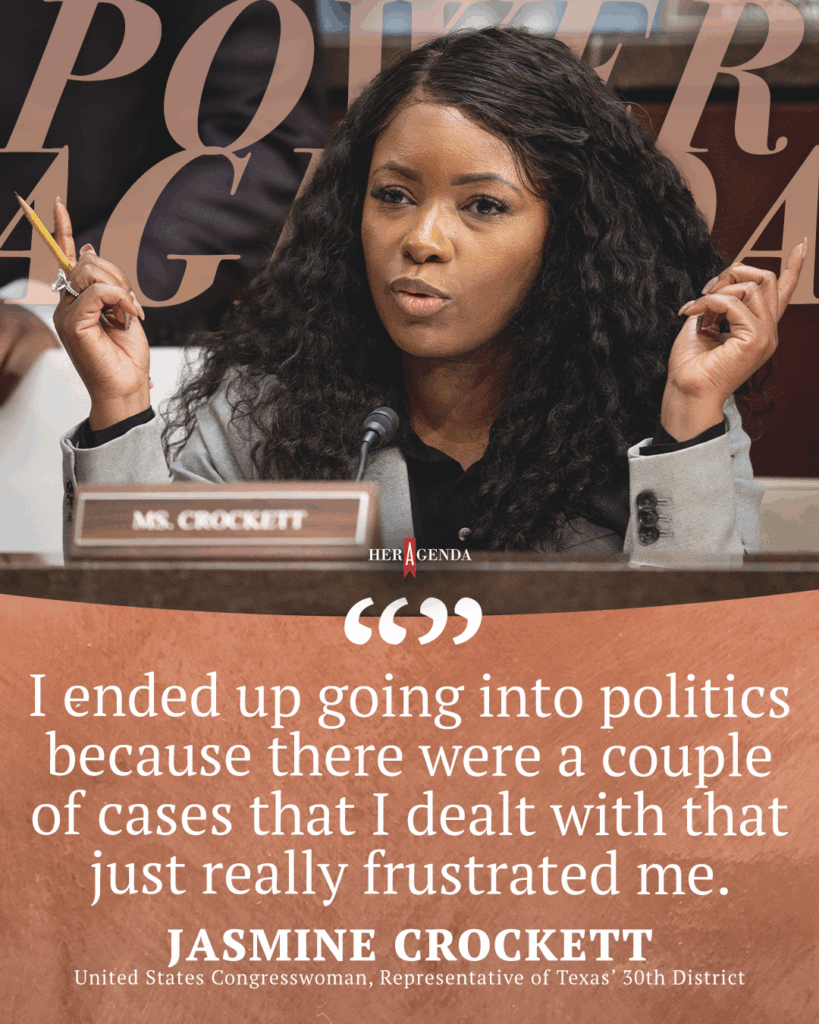
Her Agenda: What challenges do you face regularly as a woman in this field or just in Congress?
Jasmine Crockett: When I walk into a space, I always have to prove myself. I am underestimated. I don’t know how much of that is because I’m Black, or how much of that is because I’m a woman, or the combination. But I can tell you that there is a presumption of competency that I am not cloaked in, and even when I am laying out my credentials, it still seems like there’s a reason to challenge it, whereas some of my counterparts do not face that. That’s one of the biggest challenges. Also, for me, [it is important to be] able to evidence my strength, because there is always this weakness that society tries to associate with women. And it is because women tend to be nurturing and caring, but to be nurturing and caring doesn’t make you weak. That is yet another thing I’ve had to quickly correct the record on. There are a lot of ways that both my friends and foes would describe me. But one of the things that they won’t ever use, friend or foe, is that I’m weak. I think having overcome this perception of me being a wilting flower has probably helped me a little bit, but I still walk into rooms [where] if they don’t know who I am – and definitely before I established my reputation – where there just wasn’t the same level of respect given.
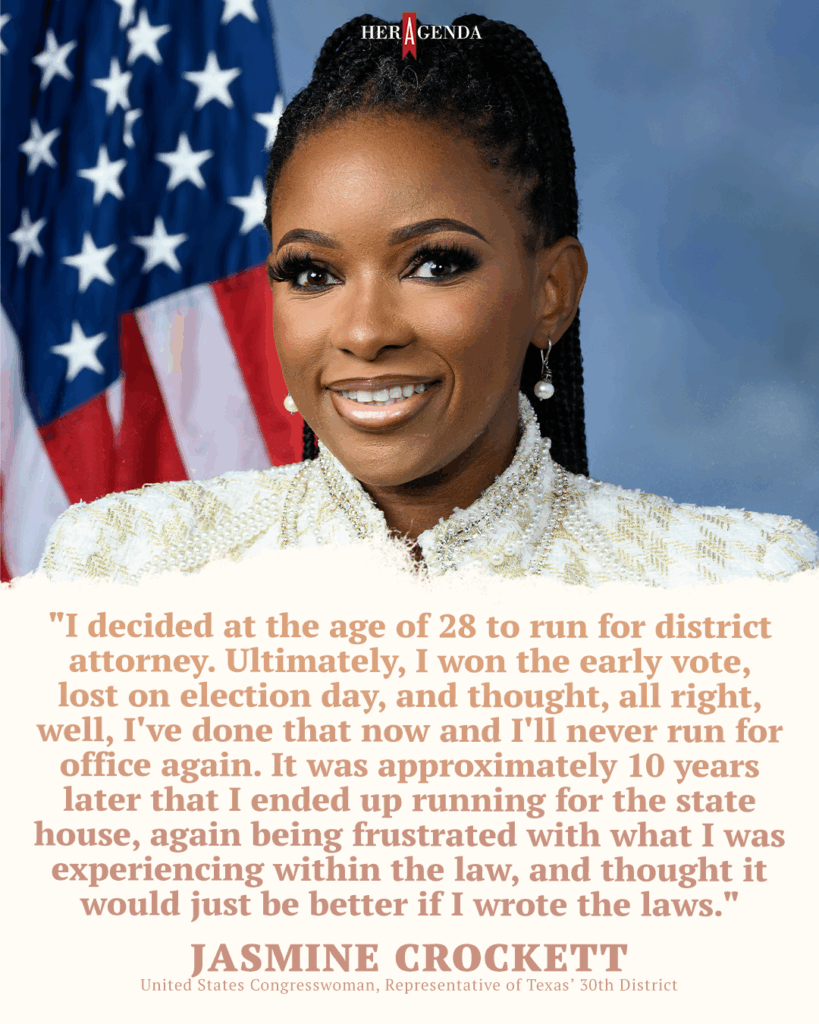
Her Agenda: What’s your response to diversity being branded as negative nowadays?
Jasmine Crockett: I think it’s cowardice. It’s [similar to what] they did during Jim Crow. When you think about how big of a loser you have to be to say that you’re a white supremacist, and then you put a hood on to cover. It’s like the ‘Keyboard Warriors’ that we’ve got out here who have fake profiles. Say it with your chest. If you truly feel like you are on the right side, then say it with your chest. I don’t hide behind anything. You won’t find me covered up. I proudly say everything that I have to say. It’s more a reflection of their own lack of self-confidence, the fact that they feel threatened consistently just by the existence of someone else who’s different – mind you, someone else who is also created by God. It really just [shows] their lack of self-confidence. And I think that there is a fear that if they end up in the minority, somehow minorities will do what [majorities] have done to minorities since the beginning of time. And I have to say, we used to talk about it all the time as we were picking juries. When I would pick juries, one of the things that I felt like I had a good pulse on [was] whether or not Black people would be forgiving of certain types of things, understanding the Black experience, and understanding how forgiving Black folk are.
Overall, Black people are church-going, faithful people, and they do have this heart of forgiveness. That’s Black folk. I say the same for the Latino community. We are so faith-driven. We believe in things like love and mercy. I will say that the evil that allowed certain people to enslave other people, I don’t see minorities ever doing that. [After] experiencing discrimination that has disallowed, small, Black, Brown, or Asian businesses from being able to really grow to the level of greatness that they could [have] if they just had a fair shot…you don’t have the desire to take anybody through it. But they are afraid that we will be who they’ve always been to us. And I’ve got news for them: We are truly faithful people, and I just don’t see that happening. I think that that’s part of the big fear. I think it is why they are so pressed to remove people of color from this country. I think it is why they are rolling back access to small business funds, government contracts, education, they are doing everything that they can to widen that wealth gap. This was the first census that we had in which the white population actually declined. I think that is what stirred everything: seeing the decline. [This is] why they’re forcing people to have babies. I think all these things are because they are afraid that they will become a minority.
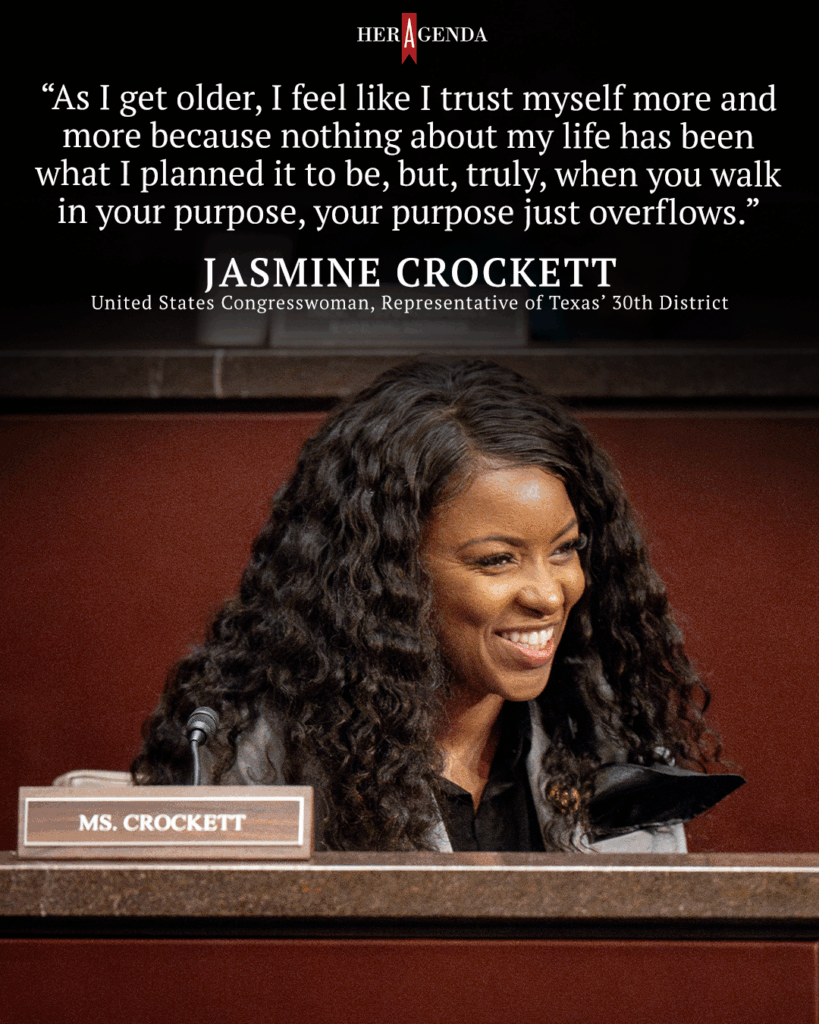
Her Agenda: What’s your message to young women and girls who feel disillusioned with the current state of our country?
Jasmine Crockett: Well, first of all, let me validate their feelings. They have every right to feel disillusioned, especially if you’re young. Things are supposed to get better and not worse, as you grow, at least in this country. So many parents tell their kids that, I made these sacrifices because I wanted you to have better than I did. And that’s the idea; we should all be standing on the shoulders of those that came before us, whether we’re talking about the political giants, or whether we’re talking about the civil rights giants, or whether we’re talking about our family members that sacrifice so much to make sure that our pathway in life was easier. So if you’re disillusioned, I tell you that you should feel validated because you have every reason to be disillusioned.
At the same time, that disillusionment should not keep you on the couch; instead, it should be a motivator. It should motivate you to decide that this is [the] fight of your generation. It is the fight for freedom that the greats like Coretta Scott King talked about – the fact that we have to fight for freedom in every single generation. The fight has to be fought and won. This is your fight. This is your call. I don’t think that the octogenarians in the Senate will be around forever to continue to wage this war, but it is up to us, the people, to show our real greatness and that there’s nothing that you can write into policy that is going to write us out or write us off. Instead, we will make the rules. We will decide where our opportunities are going to be, because we still live in a democracy and we have access to education, at least for now. We have access to freedom of speech. We have access to freedom of religion. We still have freedoms in this country, and we will fight tooth and nail to make sure that no one will roll back our freedom in this country. We are the real patriots, and the most patriotic thing that we can do is fight for our constitutional rights as well as all other rights that have been fought for and won and a lot of those fights included bloodshed as well as death. We will honor those that came before us and make sure that we continue that fight.
[Editor’s note: This article has been edited for length and clarity.]






